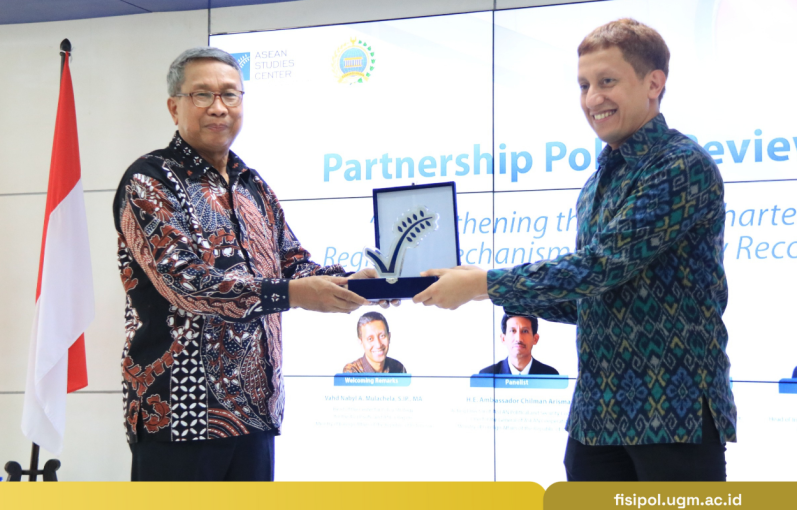
Yogyakarta, 11th of September 2024—This year, Laos was chosen to hold the ASEAN chairmanship after the last role was given to Indonesia. When Indonesia was the chair of ASEAN, the organization has faced many developments in multiple sectors. Currently, ASEAN is experiencing a shift from a state-oriented policy into a people-oriented one. This has caused a polemic in ASEAN’s role as a regional organization, as well as its relationship with its member states.
UGM’s Faculty of Social and Political Sciences, as well as the ASEAN Studies Center, held a discussion regarding policy directions of the organization in the theme of “Strengthening the ASEAN Charter: Reviewing the Regional Mechanism and Public Recommendations” on Wednesday (11/9). This discussion presented three panelists from the Indonesian Ministry of Foreign Affairs, political and international relations experts of UGM, as well as representatives from the Centre for Strategic and International Studies (CSIS).
“The world now has different needs than it used to before, so we need to adapt. ASEAN needs to change its organizational structure in order to lead the development of its member states,” explained Vahs Nabyl A. Mulachel, S.IP., MA, as Head of the Center for Policy Strategy for the Asia Pacific and Africa Region, the Ministry of Foreign Affairs of the Republic of Indonesia. This year, ASEAN became one out of the three main focuses in the policy agenda mentioned by the Indonesian Ministry of Foreign Affairs.
The background for the urgency of reviewing the ASEAN Charter is the political issues of ASEAN member states. These issues will have an effect on the regional political stability of Southeast Asia. Right now, Myanmar is in the middle of a political turmoil caused by the civil war between the military junta and civic movements. Armed conflicts in the country have caused thousands of civilian casualties. The principle of non-intervention in ASEAN was highlighted due to its inefficiency in handling crises in its member states.
Chilman Arisman, as diplomat from the Directorate for ASEAN, the Ministry of Foreign Affairs of the Republic of Indonesia, explained that the relevancy of the ASEAN Charter is in the middle of facing its own challenges after its conception many years ago. “The ASEAN Charter is intended to be a legal foundation with a clear and effective organizational structure. Meanwhile, we are currently seeing challenges in facing the changes in the political and economic sector of the ASEAN member states,” Spoke Chilman.
Chilman mentioned that there are at least five things that can pose a challenge in implementing the ASEAN Charter. There is a difference of political systems and national interests, difference in economic level, the lack of problem-solving, limited roles of ASEAN as a regional organization, and external influences. For years, some ASEAN member states were not committed to the role of ASEAN, as well as the implementation of the ASEAN Charter in the years before. The limited nature of policies in regard with the non-interference policies even made member states ignore ASEAN policies.
“Indonesia, in its time as the ASEAN Chair, tried to rebuild trust and commitment between the ASEAN member states. This effort was seen at the 43rd ASEAN Summit in Bali. We need to do some contextualization in regards to the ever-changing political dynamics,” explained Chilman.
Agreeing with Chilman, Dee Lina Alexandra, as representative of the CSIS, emphasized upon the importance of ASEAN sustainability as an organization. “Our mission here is to preserve ASEAN, so that it survives and develops as an organization. Then, the most important thing is to make ASEAN both relevant and credible as a regional organization,” argued Lina. Lina divided the challenges of the ASEAN Charter into two sections, which includes internal regional issues and external ones. He mentioned that the conflict in Myanmar is the only challenge that the ASEAN Charter cannot solve.
The ASEAN Charter that the regional organization currently adopts is about 17 years old. Even then, there is no further review nor revision. Ideally though, a charter has to be reviewed once every five years. This means that the ASEAN Charter should experience reviews and revisions three times since its conception. This problem is not just an obligation for some countries, but all member states of ASEAN.
“The ASEAN Charter is not just a mere document, but is a guide that can influence policy making. It can also be a form of shared commitment in facing global problems,” mentioned Lina. Further discussions regarding both review and revision of the charter by the ASEAN Studies Center is expected to push governments to review the charter. Other than that, strengthening the commitment can also help create peace, justice, and strong institutions. Creating peace, justice, and strong institutions is a part of the commitment to UN SDGs 16.
